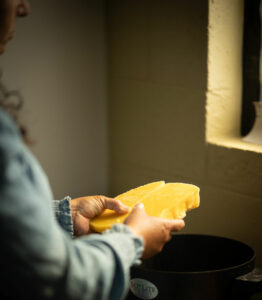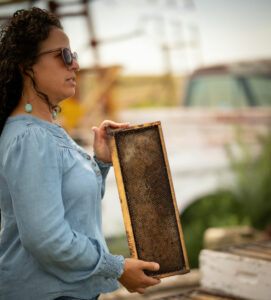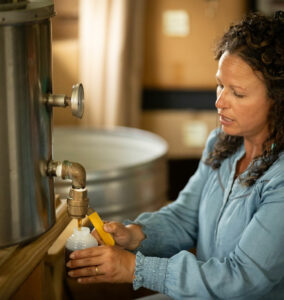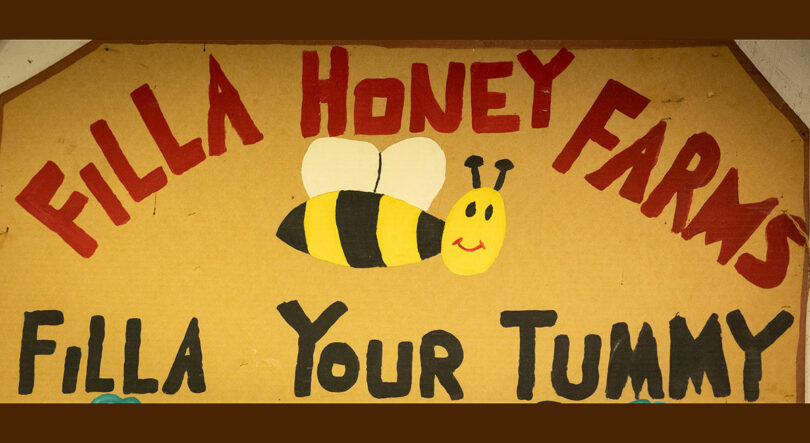Jessica Filla is passionate about bees.
As she explained during CCL Editor Kylee Coleman’s visit in July, there is a lot more to beekeeping than having hives and producing honey. Having a strong family history, detailed beekeeping practices, pollination commitments, and keeping the operation current are what makes Filla Honey unique. Filla Honey is a family-owned, multigenerational business located near Akron. Current operators are Barney Filla, his wife Jessica, and their three children Leigha, Jackson, and Anderson.
The family beekeeping business began in the early 1900s in Arapahoe, Wyoming, on the Wind River Reservation. Barney’s grandparents, Glenn and Martha Colva, found their beekeeping inspiration from having an agricultural-based business during the summer while teaching school and leading local 4-H programs. Their four children, Charla Mae, Arlie, James, and Nancy Kay all participated in beekeeping. The family later moved to Riverton, Wyoming, and continued honey production.
 Eventually, the family joined Sioux Honey, a Honey was sold in bulk quantities and then marketed in major supermarkets and food manufacturers. In their adult lives both James and Arlie continued to own and operate their own beekeeping businesses. These businesses are active today operating under Sunshine Honey Company and Colva Honey Works (operated by Chirstina Colva, Arlie’s daughter).
Eventually, the family joined Sioux Honey, a Honey was sold in bulk quantities and then marketed in major supermarkets and food manufacturers. In their adult lives both James and Arlie continued to own and operate their own beekeeping businesses. These businesses are active today operating under Sunshine Honey Company and Colva Honey Works (operated by Chirstina Colva, Arlie’s daughter).
Like all ag businesses, there is a lot more to beekeeping than having hives in the backyard. Having a secure food source, pest management, healthy queen bees, and pollination are some major components to beekeeping. Bees need water and nectar from wildflowers to survive. Bees depend on wildflowers in the early spring, such as dandelions that are commonly controlled. If there is not a strong floral source, the bees are fed corn syrup. Each hive has a gallon size feeder where the liquid feed is administered every week. Depending on the conditions, this feeding process may need to be done in the fall as well. Otherwise, the purple bloom of alfalfa is one of their primary floral sources.
Pest management is critical in maintaining a healthy hive. Bees are vulnerable to several different pests including the varroa mite, wax moth, nosema, and hive beetle. Filla pest management involves the routine inspection of hives during all seasonal periods and more often during April through August.

Jessica Filla pours fresh honey at her
farm in Akron.
Beekeepers are often referred to pollinators. For the Filla family, this process involves the hives being shipped to California to pollinate the almond groves. The bees are gone from November to April. Almond grove owners rent hives to maximize the number of almonds their trees produce. This also provides a warmer climate for the bees to winter.
Honey is produced in the hives during the spring and summer months. Nectar is gathered by female bees and brought back to the hives. Extra boxes called supers are placed on the hives and the bees fill them up. Oftentimes, the floral source determines the color, consistency, and sugar content of the honey. At the end of the summer, the supers are removed and spun out. This process is done at the Filla Farm. The honey is shipped in 55-gallon barrels to Sioux Honey (a member-owned honey co-op, known as the world’s largest honey marketing organization) or bottled for local sale.
 Currently the Fillas strive to operate just under one thousand hives. This is considered relatively small in the commercial beekeeping world. Most of the field work is done by Barney, Jessica, and their son Anderson. Their other two children Leigha and Jackson are ironically allergic to bee venom. Most of their jobs include building hives, painting hives, truck driving, organizing the storage area and managing inventory of supplies. If the climate is right, Leigha and Jackson can extract honey as long as there are no live bees around. The family makes routine trips to California to check on their hives and perform maintenance. This ensures they have a healthy start to their honey production months. Barney along with his Uncle James and cousin Christina are keeping the multigeneration business alive. Although beekeeping is currently challenging, the Fillas strive to continue the business with hopes that there may be some answers in the future about the “why” of declining bee population.
Currently the Fillas strive to operate just under one thousand hives. This is considered relatively small in the commercial beekeeping world. Most of the field work is done by Barney, Jessica, and their son Anderson. Their other two children Leigha and Jackson are ironically allergic to bee venom. Most of their jobs include building hives, painting hives, truck driving, organizing the storage area and managing inventory of supplies. If the climate is right, Leigha and Jackson can extract honey as long as there are no live bees around. The family makes routine trips to California to check on their hives and perform maintenance. This ensures they have a healthy start to their honey production months. Barney along with his Uncle James and cousin Christina are keeping the multigeneration business alive. Although beekeeping is currently challenging, the Fillas strive to continue the business with hopes that there may be some answers in the future about the “why” of declining bee population.
There are several hardworking beekeepers in northeastern Colorado. Beekeeping is becoming more popular, and supplies are even sold locally at farm and ranch stores. Any honey purchased in our area is considered local. Local meaning common floral source which is why eating honey helps with allergies. This is because you are getting small doses of pollen that you are allergic to allowing your body to build up a natural resistance.
The Filla family is proud to continue the family tradition of beekeeping. Currently they are working on several licensing opportunities with the state to expand their operation to other areas such as candle making and retail sales.
Kylee Coleman is the editor of Colorado Country Life magazine. Bee sure to read our cover story this month to learn more about beekeeping and Colorado’s Bee Colorado.

